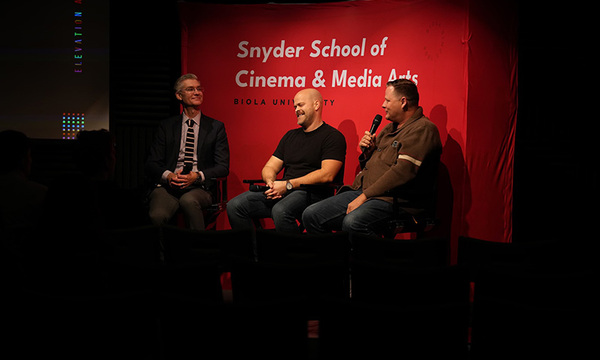Biola University’s Center for Christian Thought recently hosted its first event on near-death experiences with New York Times bestselling author Jeffrey Long. The center welcomed Long, who wrote Evidence of the Afterlife: the Science of Near Death Experiences after interviewing more than 1,600 people about their near death experiences.
As his book rose to the New York Times bestseller list, he became sought after by Time magazine, MSNBC and the Washington Post for his research.
“This book has changed my life,” Long said. “People have welcomed [the book] with open arms. Its changed how I interact with my patients. They open up to me now, telling me their experiences.”
After publishing his book, Long created a website — the largest near-death experience site on the internet — where people can record their experiences. There are currently more than 3,000 different experiences recorded on the site from people around the world. It is translated into over 23 languages and welcomes people around the world to share their experiences.
Evan Rosa, communications coordinator for the center, noted that Long’s publications have caused recent stir of discussion about whether near-death experiences substantiate the reality of life after death, an immaterial soul and even the existence of God.
The event attracted many Biola students, staff and outside guests who filled Calvary Chapel on campus. Long offered skeptics and believers evidence to support near-death experiences, presenting a number of reasons why near death experiences are to be trusted.
“I’ve carefully examined each skeptical view and they’ve all failed,” he said. “Near-death experiences all point to a reality, a soul and an afterlife.”
When people have these experiences, their brain stops, said Long. Following cardiac arrest, the electrical activity (EEG) goes flat, he explained. Yet out of his research, he discovered that nearly 75 percent of people reported being more conscious and alert than when their brain is functioning normally.
Long describes this experience to be a special level of consciousness. He finds that, no matter how many years go by, people are still able to vividly remember their experiences.
Of those who reported near-death experiences, 45 percent of people had an out-of-body experience, in which they witnessed nurses or family in the hospital speaking. 92 percent of those who reported out-of-body experiences were without inaccuracy, meaning they could quote whole conversations that had happened while unconscious.
The center recently posted a short podcast on how one of these out-of-body experiences gave a man knowledge he couldn’t have obtained if he was unconscious.
“This is a good example of how [near-death experiences] relate to neuroscience and the soul - scientists, philosophers and theologians alike have begun to question whether consciousness is a process of immaterial minds, or simply a brain process,” Rosa said. “And if your brain's dead when you have a [near-death experience], then it looks like there might be evidence that consciousness is something more than a brain process.”
In his research, Long found that factors like age, culture or anesthesia had no statistical impact on the content of a near-death experience.
“It is an equal opportunity experience, if you will,” said Long.
The content of the experiences proved to be similar. Some reported seeing colors that they’d never seen on earth. Others said they were able to see in a spherical perspective, rather than in a single direction. Some felt they were able to use their brain’s full capacity when having their experience. Long described this as trying to fit an ocean of knowledge into a teacup when they woke from their unconsciousness.
“People are different after their near-death experience,” Long said. Many people said they no longer fear death. “These experiences are medically inexplicable. They must provide evidence of the reality of a soul,” he said.
The event was recorded and will soon be featured on Open Biola and Biola’s YouTube channel. The final event of the year for the center is the Neuroscience and Soul conference on May 10 and 11. Find out more about this event on the CCT website.
Written by Rachel Snyder, Media Relations Intern. For more information, contact Jenna Bartlo, Media Relations Specialist, at 562.777.4061 or at jenna.l.bartlo@biola.edu
 Biola University
Biola University
_(1).jpg)
